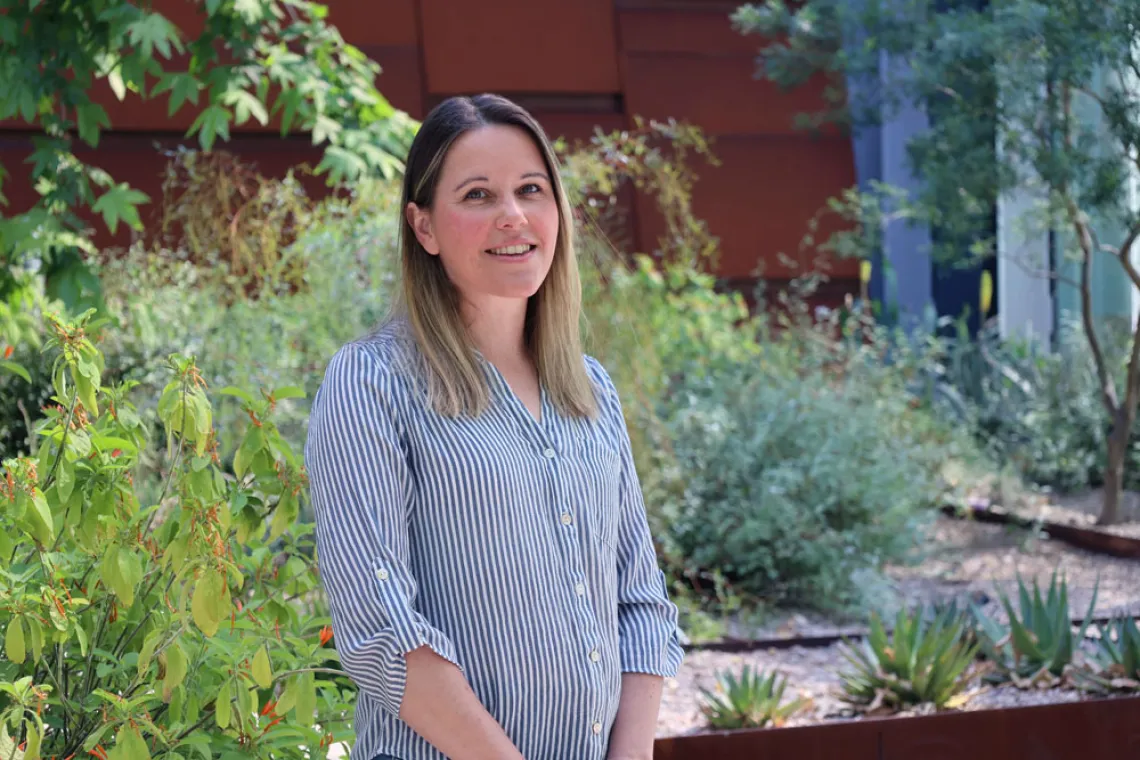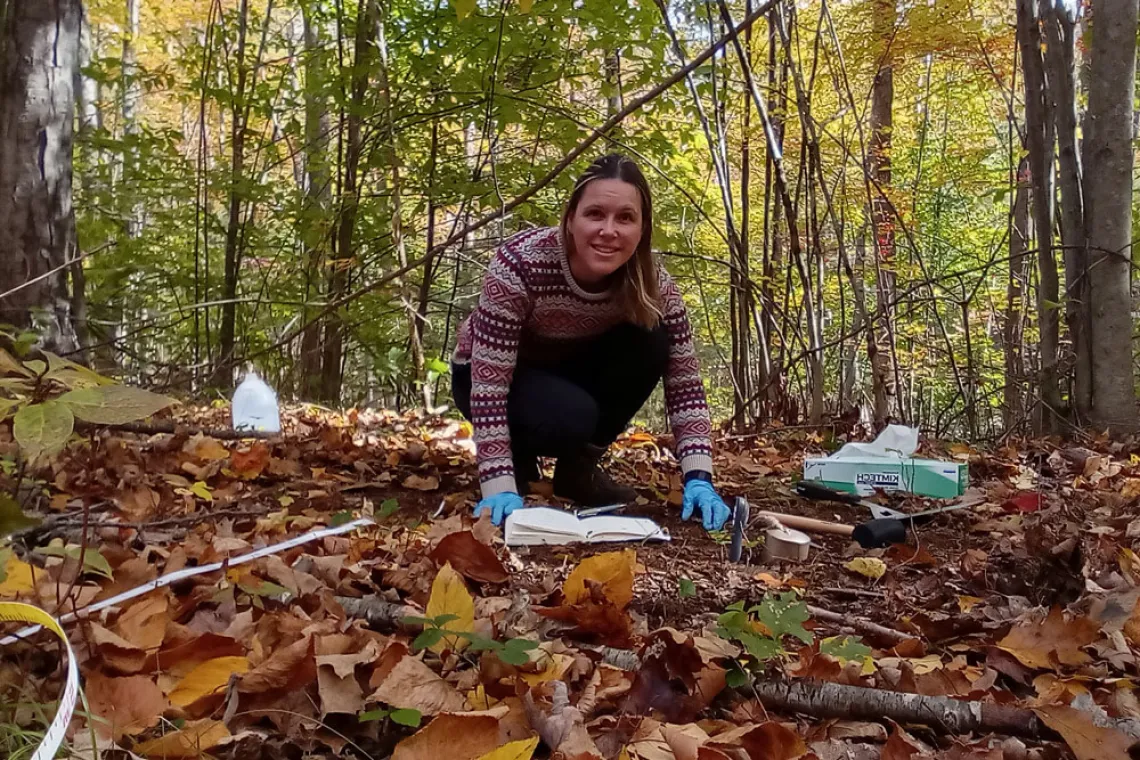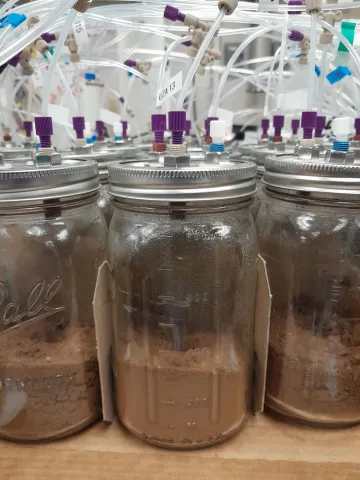BIO5 Postdoctoral Fellow secures internal funding to explore the “memory” of soil
Gemma Purser was awarded an internal grant in the lab of BIO5 member Laura Meredith that will help expand research on understanding the dynamics of volatile organic compounds in the soil.

Postdoctoral researcher Gemma Purser secured an internal grant through the University of Arizona Office of Research, Innovation & Impact (RII) that will broaden her work on volatile organic compounds (VOCs) by analyzing the genetics of microbes in the soil. Purser and her team plan to leverage the expertise at the Arizona Genetics Core, a research service housed within the BIO5 Institute building.
Purser studies VOCs in the lab of BIO5 member and associate professor Laura Meredith, where they study the role of microbes within soil-atmosphere dynamics. As a 2024 BIO5 Postdoctoral Fellow, she was awarded a small grant as an outstanding postdoctoral researcher working with a BIO5 member on interdisciplinary research.
“This is the first grant, besides the BIO5 Postdoctoral Fellowship, that I’ve won,” said Purser. “I’m excited to expand my skillset into soil microbiome analysis and use in-house resources at the BIO5 Institute.”
The funded project, “Using gene expression to track ‘soil memory’ and adaptation effects of microbial community shifts in the consumption of volatile organic compounds in soil,” was written by Purser with support from research specialist Juliana Gil Loaiza and Meredith in the UArizona School of Natural Resources and the Environment.
The importance of VOCs in the air and soil
VOCs are a diverse group of carbon-based chemicals emitted by both natural (plants and microbes) and man-made (industrial processes and household items) sources. How VOCs act in our ecosystem is important for addressing air pollution and protecting human health, as well as protecting ecosystems by mitigating environmental impacts.
Microbes beneath the soil process different sources of carbon as part of their life cycle, and so are an important piece of the puzzle when studying VOCs.

Gemma Purser, PhD, collects soil samples for her BIO5 Postdoctoral Fellow research project focused on volatile organic compounds.
Gemma Purser
Purser initially studied natural VOCs in the atmosphere for her doctoral work, investigating how trees planted as part of plans to achieving net-zero emissions in the United Kingdom can impact air quality. Now as a postdoctoral researcher working in the Meredith lab, she is expanding her work to study the chemical and biological interactions of these carbon-based compounds in the soil.
“Since VOCs are released by plant roots, we need to understand the dynamic relationship between plants and microbes beneath the surface of the soil,” said Purser.
Building on experiments funded by the BIO5 Fellowship

Purser and the Meredith lab conduct experiments as part of the National Science Foundation Signals in Soils project.
Gemma Purser
Using funds from the BIO5 Postdoctoral Fellowship, Purser led a collaborative independent research project with Urban Biogeochemistry program at Boston University and Aerodyne Research, Inc. (ARI). She conducted soil experiments using advanced mass spectrometer instrumentation at ARI and will work with Boston University to further develop her microbial analysis techniques.
The results from those soil experiments, as well as others as part of the National Science Foundation Signals in the Soils project led by Meredith, produced interesting chemical results that left Purser and the team wanting to conduct further analyses. Guided by her mentor Meredith, Purser applied and won internal funding through the UArizona RII Core Facilities Pilot Program.
“With this grant we can explore what we call the memory of soil, or how long the microbes in the soil retain their ability to utilize VOCs, breaking them down or converting them in the process, removing them or changing the way they appear in the environment, all in their own pursuit of being able to use the VOCs as a source of energy to grow,” said Purser.
Purser and the team will extract DNA and RNA from soil samples through the Arizona Genetics Core, giving them clues into the genetic makeup of microbial communities. They are hoping these analyses will allow them to more deeply understand how specific microbes process VOCs.
“I feel that understanding the role of VOCs, whether that’s those coming from the atmosphere or plant roots, and their influence on the microbial communities in soil is a question at the forefront of our scientific research field,” said Purser. "It is an essential step we need to address if we are to understand the bigger surrounding plant and soil health and air quality.”
Supporting early career researchers
The BIO5 Postdoctoral Fellowship is designed to support and enhance early career researchers in their independent research journey through both a small grant and professional development.
Established in 2019 by Michael D.L. Johnson, assistant professor in the UArizona Department of Immunobiology and inaugural Keating Family BIO5 Professor, the fellowship has assisted over 45 postdoctoral researchers in their scientific journey.
"Being awarded the BIO5 Postdoctoral Fellowship gave me confidence to apply for bigger grants,” said Purser. “Plus, it’s helping me build a scientific network at the University of Arizona, extending collaborations to work with Chris Frost in the chemical ecology labs and find collaborations for future VOC research both in the USA and internationally.”
